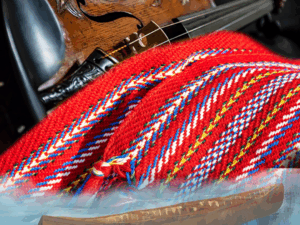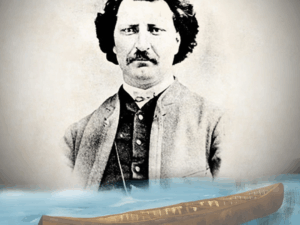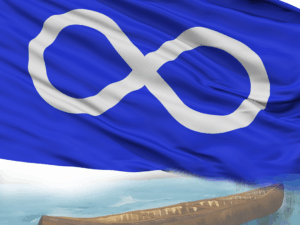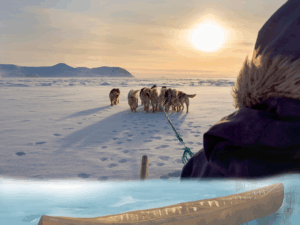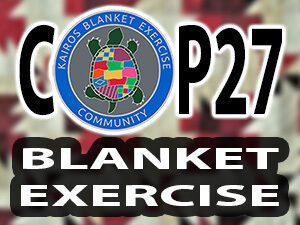Spirited Reflection: Another session of the KAIROS Blanket Exercise

It’s over. The Narrator has finished speaking. The room falls quiet. The few participants, still standing, glance at each other.
The Narrator then asks everyone to think back to what the room looked like at the beginning of the Exercise – when the whole floor was covered in blankets and all the participants were walking about on them. And to look at the room now, with just a few blankets scattered here and there – blankets just large enough for the remaining handful of people to stand on. The Narrator asks us to hold those images as we take our seats to begin the Talking Circle.
This is another session of the KAIROS Blanket Exercise. It’s an experiential learning exercise that takes participants through 400 years of Indigenous history in the space of a couple of hours. The blankets represent the land we know today as Canada. The participants represent the Indigenous peoples. They are given quotations from Indigenous people to read at key points and cards which determine their outcome in the Exercise. Facilitators act as Narrator and European and an elder opens the Exercise and leads the Talking Circle which follows.
KAIROS is an ecumenical organization supported by ten churches and religious organizations working together in faithful action for ecological justice and human rights in Canada and internationally. In 1996 the Report of the Royal Commission on Aboriginal Peoples was released. In response, KAIROS staff, together with Indigenous elders and teachers, developed the Blanket Exercise based on the Commission’s research. On June 2, KAIROS will celebrate the 20th anniversary of the Blanket Exercise with a mass Blanket Exercise on Parliament Hill.
I came across the Blanket Exercise last spring when I was looking for ways to engage in Indigenous rights issues. Why Indigenous rights issues? Because it seems to me that the relationship with Indigenous peoples is foundational for who we are in this place. If that relationship is not based on mutual respect and if it doesn’t provide positive outcomes for both groups, then all we have built here is like the proverbial house built on sand. So, as a starting place, I signed on as a volunteer facilitator with the KAIROS Blanket Exercise and, since September, I’ve assisted with over 30 sessions ranging in size from 15 to 300 participants. Participants have included students from grade 6 to college and university level, teachers, business groups and government staff. I’ve also been reading extensively: The TRC Summary Report, memoirs, autobiographies, fiction, and history by Indigenous authors. The reading puts names, faces, and places to some of the events described in the Blanket Exercise.
The Talking Circle starts and, one by one, people share their experience of the Blanket Exercise. The Talking Circle is a safe space where participants can share their feelings and responses in confidence. Aspects of the difficult history recounted through the Blanket Exercise can trigger strong emotions among participants. Tears are not uncommon and anger sometimes. For parents of young children it’s the residential schools. For people with a personal or family history of oppression and displacement in another country, it could be the pass system or the forced relocation of communities. For some recent newcomers, it’s shock that this history doesn’t fit the “brand” of Canada they were told about. For some it helps to explain why the fact that a grandparent was Indigenous was kept hush-hush in the family. Other people whose families have been here for generations are shocked that they didn’t know this history. Sometimes they are overwhelmed with guilt and shame when they learn what happened.
For me, this year has been a powerful journey. Through the Blanket Exercise and the related reading, I’ve learned about other aspects, beyond the residential schools, of this long term abusive relationship between the government of Canada and Indigenous peoples. There is also theft, broken agreements, double dealing, deceit, extortion, infringement of human rights, forced relocation, mass unlawful confinement, coercion, obfuscation, and needless delay. And it’s still going on.
This is very unsettling. But we have to “own” this history; we have to try to understand what set us on this trajectory and we have to struggle to find a different path. This won’t be easy. We have assumed cultural superiority for so long that it’s second nature. Getting past that hurdle and others will take hard work – but work that is essential to building a relationship based on mutual respect.
I’ve also become aware that Indigenous people in Canada have done a tremendous amount of hard work to find and implement ways recover from trauma, to get past anger, to recover traditions, to rebuild community, to stay strong, and to be ready for and open to dialogue with the rest of Canada.
We need to step up.
In the Talking Circle, now it’s my turn. After each Exercise, I’m left with overwhelming gratitude to Indigenous people – for their resilience, their strength and courage and especially for their amazing generosity of spirit to be willing to have a conversation – still – after everything.
And also hope. I’m hopeful when I see the participants bringing an open mind and an open heart to this Exercise and when I sense their desire to build a different relationship.
We are at a precious moment in our history. Senator Murray Sinclair said recently that it will take generations to reach reconciliation. Yet I am hopeful that, now, we are setting our feet firmly on that path and – we won’t turn back.
Judith Ramsay is a KBE facilitator with the KAIROS Blanket Exercise (KBE) and a member of Eastminster United Church in Toronto. Judith’s background is in community development, energy conservation, and renewable energy; she is a founding member of three co-operatives.




